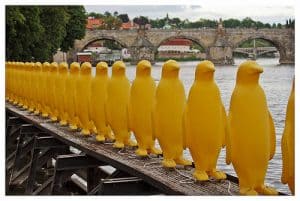
Do we utter that “L” word too loosely these days? So much so that the term leader no longer signifies what it once did? Is it one of those “jump on the bandwagon” things? And is the residual effect a deflated term, with any clarity or specialty of the role all but whittled away? Or has the definition of leader just evolved?
The big leader pot
When I became a career coach more than 20 years ago, leadership had a very specific significance. Leaders of nations. CEOs. Popes. You would not call a department manager—and definitely not someone on a three-person team—a leader. Now, if Mary is on that team and gets things moving, she’s a leader. The student who hands his assignments in on time and contributes to discussion is a leader. My client Ginny, an educator, is in her third Leadership Development course. She is not going to be a superintendent or principal; she is happy being a fifth grade classroom teacher. Could it more aptly be named a Career Development course?
Initiative?
It’s admirable to better oneself. Always. But can we each do this without being a leader?
Like a broken record, I tell my clients to be CEOs of their careers. That ah-hah analogy first came to me when I was doing an outplacement career management workshop for a global manufacturer about 10 years ago. During my stint there, the CEO’s executive assistant announced she wanted to make both the reception area and boardroom more inviting. She asked not only her boss, the CEO; but the entire executive team and all department heads, to give her a list of scheduled visitors for the next week or so. When visiting executive Ms. Roberts walked in, she was greeted with “Here’s that green tea you love. And you’re booked at the downtown Radisson since you love their gym and pool.” This executive assistant did not think she was going to be a leader of the company. It had one. Well, several. She wanted to perform in her job above and beyond expectations.
People at the company were without a doubt inspired; some even emulated the mantra. But in this case, was it leadership? Influence, yes. I think really we’re talking about engagement; doing what one does well and not sitting back to underachieve. When you think about the characteristics of a good leader, initiative and integrity to do the right thing are often evident. But aren’t those the same qualities we want in an empowered employee working autonomously on the production line? Or a team working through a Six Sigma project?
Shared and taught?
There are changes in leadership related to technology too. Movements in the Middle East and U.S. have grown without designated leaders. It’s been a shared process. An interesting perspective here is that many of the same characteristics are present in the leaders and followers. Both had to be committed and courageous. To push forward. But there were no doubt those who although they could likely have been appointed leaders, preferred to stay under the radar.
And leadership is repeatedly taught, as with Ginny’s situation. I believe a leader must learn how to manage a leadership image that is consistent and authentic. To clearly tell others what he/she stands for. Next, to be inspirational. Learn what motivates others toward what is aligned with that image and goal. To be—and this can be tough—positive and forward-thinking, even when it’s tough. To stay upbeat; to stimulate others to do the same. And lastly, to bring out accountability so that others do what they do best, and it’s still toward that cohesive goal, true to the leader’s image and reputation.
The evolution hits home
Perhaps because the term leader is bandied about so often and by so many, we’ve seen a blur and overlap in definition. When I was a child, if someone had asked me to name the leader I most admire, I would have readily named an astronaut, president or someone whose name had been synonymous with historical or current civics. Now, every politician’s every flaw is scrutinized. One can be a wealthy and powerful “leader” one day; and in prison the next. Remember Ginny, the fifth grade teacher? She recently asked her students to each name the leader they most respect. In a class of 35, to a child, the answers reflected parents, coaches, teachers, minister, or adults they knew.
A few years ago, I went through my city’s Chamber of Commerce Leadership Program. What I found, was that it was about empowering citizens to lead in a way that worked for them. Some in the class were high-profile community leaders in business, education or other spokes in the community wheel. And some like yours truly, were in the trenches. Serving soup at the church. Taking a petition door to door. Teaching a community education class. Leading library tours. Facilitating a workshop. It’s food for thought. Are these quiet leaders? Or more accurately, engaged human beings? I don’t know. It’s just food for thought. I’m just saying.
Photo: chackie81

